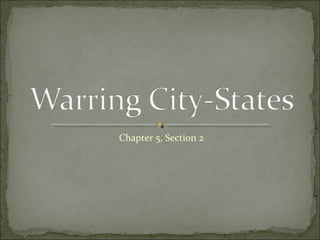
5.2 warring city states
- 1. Chapter 5, Section 2
- 2. The growth of city states in Greece lead to the development of several political systems, including democracy. All are governments Monarchy = rule by king Aristocracy = rule by nobility Oligarchy = rule by group Democracy = rule by citizens Monarchy, aristocracy, and oligarchy are all ruled by leaders
- 3. By 750 B.C. the Greek city-state, or polis, is the formal government. A polis is a city and its surrounding villages; 50-500 square miles. Population of a city-state is often less than 10,000. Citizens gather in the marketplace and acropolis—a fortified hilltop
- 4. Greek Political Structures City-states have different forms of government. Monarchy-rule by a king Aristocracy-rule by nobility Oligarchy-rule by a small group of powerful merchants and artisans
- 5. Tyrants Seize Power Rulers and common people clash in many city-states. Tyrants—nobles and wealthy citizens win support of common people. They seize control and rule in the interests of ordinary people.
- 6. Building Democracy About 621 B.C., democracy—rule by the people— develops in Athens. Nobleman, Draco, develops legal code based on equality of citizens. Ruler Solon abolishes debt slavery; Cleisthenes has citizens make laws. Only native-born, property-owning males are citizens.
- 7. Athenian Education Schooling only for sons of wealthy families. Girls learn from mothers and other female members of the household.
- 8. A Unique City State Sparta, isolated from much of Greece, builds a military state. Sparta Dominates Messenians Around 725 B.C., Sparta conquers Messenia Messenians become helots—peasants forced to farm the land. Harsh rule leads to Messenian revolt; Spartans build a stronger state.
- 9. Sparta’s Government and Society Sparta government has four branches: citizens elect officials Three social classes: Citizens Free non-citizens Helots--slaves
- 10. Spartan Daily Life Spartan values: duty, strength, individuality, discipline over freedom. Sparta has the most powerful army in Greece Males move into barracks at age 7, train until 30, serve until 60. Girls receive some military training and live hard lives Girls are also taught to value service to Sparta above all else
- 11. “Certainly, by the time he finished the agoge [training period], a young man would know for sure whether he had been marked out for future greatness. To the most promising graduates was granted the honor of one final bloody challenge.” (p. 85)
- 12. “Enrolled into a crack squad known as the Crypteia, they would be sent into the mountains, armed only with a single dagger each, and ordered to live off the land. This period of exile from their city, however, was much more than a mere endurance test.”
- 13. “Traveling alone, each member of the Crypteia would inevitably cross the Taygetos range and slip into Messenia. There, advancing soundlessly by night, as every graduate of the agoge had been trained to do, they would be expected to prove themselves as killers.”
- 14. “How else, after all, save by the careful pruning of the most able Messenians, could the Spartans hope to breed natural serfs? Just as they condemned to the Apothetae the dregs of their own city, so they aimed to extinguish any spark of talent or rebellion in their slaves. Only the truly servile could be permitted to reproduce.” (p. 86)
- 15. “Visions of female flesh, oiled and tanned, glistened in the imaginings of many a Sparta-watcher. The Spartans themselves, sensitive to the mockery that labeled their daughters ‘thigh-flashers,’ would retort sternly, ‘that there was nothing shameful about female nudity, nothing immoral in the slightest.’ In fact, ‘since it encouraged a sense of sobriety, and a passion for physical fitness,’ precisely the opposite.”
- 16. “Yet paramount though the requirements of Sparta’s eugenic program undoubtedly were, an aura of the erotic still clung to the training grounds nevertheless. The fertility of a future mother was best gauged, a Spartan might argue, by the glowing of her skin and the perfection of her [body]. Physical beauty—the long blond hair and elegant ankles for which Spartan girls were celebrated— provided the readiest measure by which moral beauty too could be judged. An ugly daughter, inevitably, would cause her parents alarm and distress.” (p. 83)
- 17. “For it was the goal of instructors not merely to crush a boy’s individuality, but to push him to startling extremes of endurance, discipline and impassivity, so that he might prove himself, supremely, as a being reforged of iron.” (p. 84)
- 18. “When, at the age of seven, a young Spartan left his home to live communally with other boys, it was more than his sense of family that was being fractured and reset: the very notion that he possessed a private identity was, from that moment on, to be placed under continuous assault.” (p. 84)
- 19. A New Kind of Army Emerges Cheaper iron replaces bronze, making arms and armor cheaper Leads to new kind of army; includes soldiers from all classes Phalanx—feared by all, formation of soldiers with spears, shields
- 23. Battle of Marathon Persian Wars—between Greece and the Persian Empire —begin in Ionia Persian Army attacks Athens, is defeated at Marathon in 490 B.C. Pheidippides Brings News Runner Pheidippides races to Athens to announce Greek victory.
- 24. Thermopylae and Salamis In 480 B.C. Persians launch a new invasion of Greece. Greeks are divided; many stay neutral or side with Persians. Greek forces hold Thermopylae for three days before retreating. Athenians defeat Persians at sea, near island of Salamis. Victories at Salamis and Plataea force Persian retreat. Many city-states form Delian League and continue to fight Persians.
- 25. Consequences of the Persian Wars New self-confidence in Greece due to victory. Athens emerges as leader of Delian League. Athens controls the league by using force against opponents. League members essentially become provinces of Athenian empire. Stage is set for a dazzling burst of creativity in Athens.
